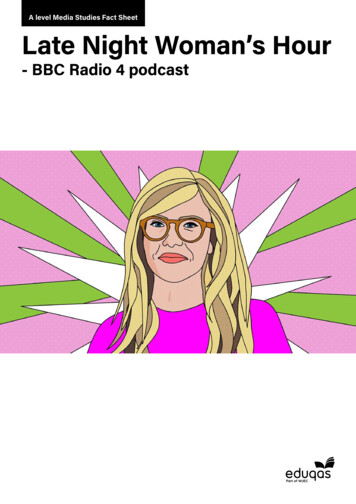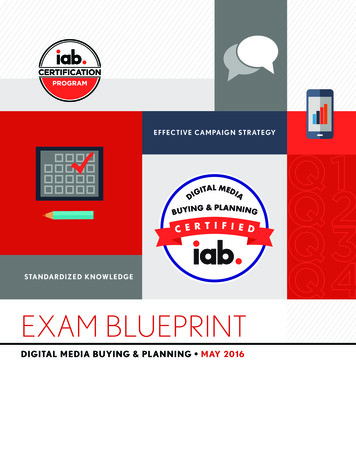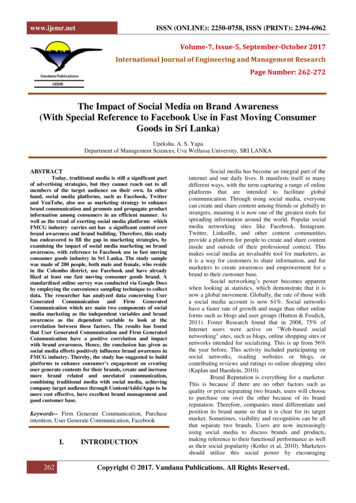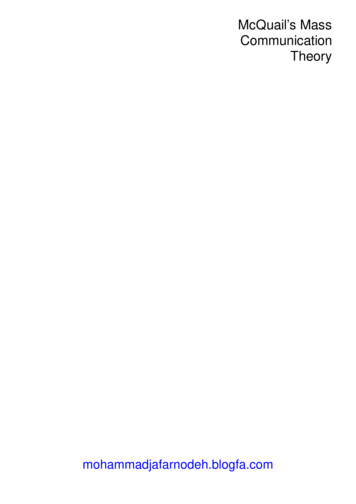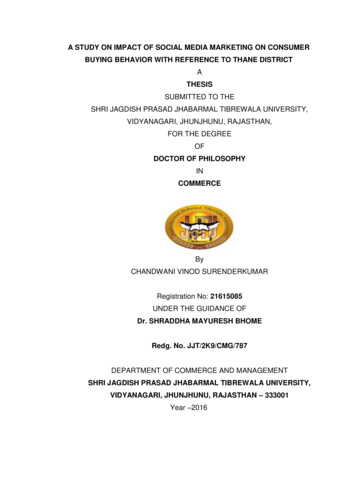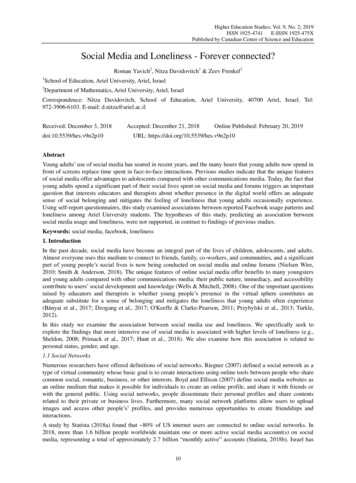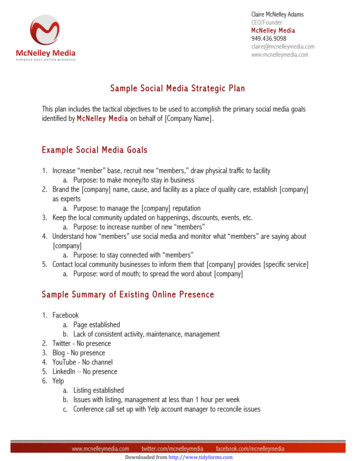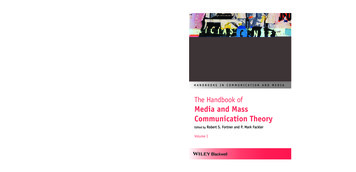
Transcription
About the EditorsRobert S. Fortner is Professor of Journalism andMass Communication at the American Universityin Bulgaria. He is the author or editor of sevenbooks and almost 100 essays.P. Mark Fackler is Professor of Communication atCalvin College, USA. He has written extensivelyon topics relating to communication andjournalism ethics.H a n d b o o k s i n C o mm u n ic a ti o n a n d M e d i aEdited byThe Handbook of Media and MassCommunication TheoryEdited by Robert S. Fortnerand P. Mark FacklerFortnerand Fackler“That this Handbook calls for two large volumes and more than four dozen essaysillustrates the dramatic pace of developing media theory in recent years. Such areference work would have been impossible a decade or two ago when serious mediatheoretical research was just getting off the ground and we had far more questionsthan potential answers. Fortner and Fackler and their impressive array of contributorsprovide an invaluable intellectual anthology of what we now know, topics which arestill only partially understood, and aspects where much remains to be done”Chris Sterling, George Washington University“A rich resource for all media-related disciplines. Impressive for its vision, bothretrospective and future-oriented; and comprehensive in its range of perspectives,from the established to the innovatory.”Denis McQuail, University of AmsterdamThe Handbook ofMedia and Mass Communication Theory“Like Rodgers and Hammerstein or Lerner and Loewe, Robert Fortner and Mark Facklerare becoming the gourmet indispensable team who provide excellent inspirationfor our field. Like Christians and Wilkins, they have set the bar with a handbook oninternational media ethics. Now they are raising that bar with The Handbook of Mediaand Mass Communication Theory, which assembles a who’s who of leading theoristsand media studies thinkers worldwide. Far more than an introduction to media theory,this double volume is the most current and comprehensive overview and analysis ofthe field. MUST reading.”Dr. Tom Cooper, Emerson CollegeH a n d b o o k s i n C o mm u n ic a ti o n a n d M e d i aThe Handbook ofMedia and MassCommunication TheoryEdited byRobert S. Fortner and P. Mark FacklerThe Handbook of Media and MassCommunication Theory presents acomprehensive series of original essaysthat focus on all aspects of current andclassic theories and practices relating tomedia and mass communication. Whiletracing the development of hundreds ofmedia theories or their variants over thepast century, this two-volume collectiondelves deeply into the most prominentand influential theories while providingenlightening case studies of theirapplication in various regional and nationalcontexts. Both empirically based theoriesand those developing from critical andnormative perspectives are included, andinternational authorship ensures a globalperspective of theoretical development.A wide range of topics is explored,including classical theories of media andthe press, social construction and control,feminist media theory, globalizationand cultural identity, theories of socialmedia and new technologies, futuredirections in media theory, and manymore. Authoritative and comprehensive,The Handbook of Media and MassCommunication Theory sets a newstandard in its compilation of the evolutionand current state of our knowledge oftheories in mass communication.Volume IVolume IFortner & Fackler 1 9780470675052.indd 110/02/2014 10:29
About the EditorsRobert S. Fortner is Professor of Journalism andMass Communication at the American Universityin Bulgaria. He is the author or editor of sevenbooks and almost 100 essays.P. Mark Fackler is Professor of Communication atCalvin College, USA. He has written extensivelyon topics relating to communication andjournalism ethics.H a n d b o o k s i n C o mm u n ic a ti o n a n d M e d i aEdited byThe Handbook of Media and MassCommunication TheoryEdited by Robert S. Fortnerand P. Mark FacklerFortnerand Fackler“That this Handbook calls for two large volumes and more than four dozen essaysillustrates the dramatic pace of developing media theory in recent years. Such areference work would have been impossible a decade or two ago when serious mediatheoretical research was just getting off the ground and we had far more questionsthan potential answers. Fortner and Fackler and their impressive array of contributorsprovide an invaluable intellectual anthology of what we now know, topics which arestill only partially understood, and aspects where much remains to be done”Chris Sterling, George Washington University“A rich resource for all media-related disciplines. Impressive for its vision, bothretrospective and future-oriented; and comprehensive in its range of perspectives,from the established to the innovatory.”Denis McQuail, University of AmsterdamThe Handbook ofMedia and Mass Communication Theory“Like Rodgers and Hammerstein or Lerner and Loewe, Robert Fortner and Mark Facklerare becoming the gourmet indispensable team who provide excellent inspirationfor our field. Like Christians and Wilkins, they have set the bar with a handbook oninternational media ethics. Now they are raising that bar with The Handbook of Mediaand Mass Communication Theory, which assembles a who’s who of leading theoristsand media studies thinkers worldwide. Far more than an introduction to media theory,this double volume is the most current and comprehensive overview and analysis ofthe field. MUST reading.”Dr. Tom Cooper, Emerson CollegeH a n d b o o k s i n C o mm u n ic a ti o n a n d M e d i aThe Handbook ofMedia and MassCommunication TheoryEdited byRobert S. Fortner and P. Mark FacklerThe Handbook of Media and MassCommunication Theory presents acomprehensive series of original essaysthat focus on all aspects of current andclassic theories and practices relating tomedia and mass communication. Whiletracing the development of hundreds ofmedia theories or their variants over thepast century, this two-volume collectiondelves deeply into the most prominentand influential theories while providingenlightening case studies of theirapplication in various regional and nationalcontexts. Both empirically based theoriesand those developing from critical andnormative perspectives are included, andinternational authorship ensures a globalperspective of theoretical development.A wide range of topics is explored,including classical theories of media andthe press, social construction and control,feminist media theory, globalizationand cultural identity, theories of socialmedia and new technologies, futuredirections in media theory, and manymore. Authoritative and comprehensive,The Handbook of Media and MassCommunication Theory sets a newstandard in its compilation of the evolutionand current state of our knowledge oftheories in mass communication.Volume IIVolume IIFortner & Fackler 2 9780470675052.indd 110/02/2014 10:29
The Handbook of Media and Mass Communication Theory
Handbooks in Communication and MediaThis series aims to provide theoretically ambitious but accessible volumes devotedto the major fields and subfields within communication and media studies. Eachvolume sets out to ground and orientate the student through a broad rangeof specially commissioned chapters, while also providing the more experiencedscholar and teacher with a convenient and comprehensive overview of the latesttrends and critical directions.The Handbook of Children, Media, and Development, edited bySandra L. Calvert and Barbara J. WilsonThe Handbook of Crisis Communication, edited by W. Timothy Coombs andSherry J. HolladayThe Handbook of Internet Studies, edited by Mia Consalvo and Charles EssThe Handbook of Rhetoric and Public Address, edited by Shawn J. Parry-Gilesand J. Michael HoganThe Handbook of Critical Intercultural Communication, edited byThomas K. Nakayama and Rona Tamiko HalualaniThe Handbook of Global Communication and Media Ethics, edited byRobert S. Fortner and P. Mark FacklerThe Handbook of Communication and Corporate Social Responsibility, edited byØyvind Ihlen, Jennifer Bartlett and Steve MayThe Handbook of Gender, Sex, and Media, edited by Karen RossThe Handbook of Global Health Communication, edited by Rafael Obregonand Silvio WaisbordThe Handbook of Global Media Research, edited by Ingrid VolkmerThe Handbook of Global Online Journalism, edited by Eugenia Siaperaand Andreas VeglisThe Handbook of Communication and Corporate Reputation, edited byCraig E. CarrollThe Handbook of International Advertising Research, edited by Hong Cheng
The Handbook of Media andMass Communication TheoryVolume IEdited byRobert S. Fortner and P. Mark Fackler
This edition first published 2014 2014 John Wiley & Sons, Inc.Registered OfficeJohn Wiley & Sons, Ltd, The Atrium, Southern Gate, Chichester, West Sussex, PO19 8SQ, UKEditorial Offices350 Main Street, Malden, MA 02148–5020, USA9600 Garsington Road, Oxford, OX4 2DQ, UKThe Atrium, Southern Gate, Chichester, West Sussex, PO19 8SQ, UKFor details of our global editorial offices, for customer services, and for information abouthow to apply for permission to reuse the copyright material in this book please see our website atwww.wiley.com/wiley-blackwell.The right of Robert S. Fortner and P. Mark Fackler to be identified as the authors of the editorialmaterial in this work has been asserted in accordance with the UK Copyright, Designs and PatentsAct 1988.All rights reserved. No part of this publication may be reproduced, stored in a retrieval system, ortransmitted, in any form or by any means, electronic, mechanical, photocopying, recording orotherwise, except as permitted by the UK Copyright, Designs and Patents Act 1988, without theprior permission of the publisher.Wiley also publishes its books in a variety of electronic formats. Some content that appears in printmay not be available in electronic books.Designations used by companies to distinguish their products are often claimed as trademarks. Allbrand names and product names used in this book are trade names, service marks, trademarks orregistered trademarks of their respective owners. The publisher is not associated with any product orvendor mentioned in this book.Limit of Liability/Disclaimer of Warranty: While the publisher and authors have used their bestefforts in preparing this book, they make no representations or warranties with respect to the accuracyor completeness of the contents of this book and specifically disclaim any implied warranties ofmerchantability or fitness for a particular purpose. It is sold on the understanding that the publisher isnot engaged in rendering professional services and neither the publisher nor the author shall be liablefor damages arising herefrom. If professional advice or other expert assistance is required, the servicesof a competent professional should be sought.Library of Congress Cataloging-in-Publication data has been applied forHardback ISBN: 978-0-470-67505-2A catalogue record for this book is available from the British Library.Cover image: Isabelle Rozenbaum / Getty Images.Cover design by Simon Levy Associates.Set in 10/13pt Galliard by SPi Publisher Services, Pondicherry, India12014
ContentsVolume INotes on Contributors ixIntroduction xixPart IClassical Theories of Media and the Press 1Classical Liberal Theory in a Digital World Stephen J. A. Ward2The Origins of Media Theory: An Alternative View Robert S. Fortner3Political Economic Theory and Research: Conceptual Foundationsand Current Trends Vincent Mosco1322374Semiotics and the Media Bronwen Martin565Symbolic Interactionism and the Media Norman K. Denzin746Patterns in the Use of Theory in Media Effects Research W. James Potter957Cultivation Theory: Its History, Current Status, andFuture Directions Daniel Romer, Patrick Jamieson, Amy Bleakley, andKathleen Hall Jamieson8Media Ecology: Contexts, Concepts, and Currents Casey Man Kong Lum9Dramatistic Theory: A Burkeian Approach to the 2004Madrid Terrorist Attacks Cristina Zurutuza-Muñoz115137154
viContents10 Ritual Theory and the Media John J. Pauly17211 Jacques Ellul and the Nature of Propaganda in the Media Randal Marlin19012 Lewis Mumford: Technics, Civilization, and Media Theory Robert S. Fortner21013 The Impact of Ethics on Media and Press Theory Clifford G. Christians225Part II Audiences, Social Construction, and Social Control 24914 Agenda-Setting Influence of the Media in the Public Sphere Maxwell E. McCombs and Lei Guo25115 The Uses and Gratifications (U&G) Approach as a Lens forStudying Social Media Practice Anabel Quan-Haase and Alyson L. Young16 The Media’s Impact on Perceptions of Political Polarization Jeffrey Crouch and Mark J. Rozell26928717 The Social-Cultural Construction of News: From DoingWork to Making Meanings Daniel A. Berkowitz and Zhengjia Liu30118 Media, Civil Society, and the Public Sphere: Historyand Current Thinking Robert S. Fortner, Ann Snesareva, and Ksenia Tsitovich31419 The Genesis of Social Responsibility Theory: William ErnestHocking and Positive Freedom Clifford G. Christians and P. Mark Fackler333Part III357New Approaches and Reconsiderations 20 Feminist Media Theory Linda Steiner35921 Media, Communication, and Postcolonial Theory Shanti Kumar38022 Reconceptualizing “Cultural Imperialism” in the CurrentEra of Globalization Mel van Elteren23 Al Jazeera Remaps Global News Flows Catherine Cassara24 Nonviolence as a Communication Strategy: An Introductionto the Rhetoric of Peacebuilding Ellen W. Gorsevski400420440
Contentsvii25 Globalization and Cultural Identities: A Contradiction in Terms? Ana Cristina Correia Gil46226 Cultivation Theory in the Twenty-First Century Michael Morgan, James Shanahan, and Nancy Signorielli48027 Media Theory and Media Policy: Worlds Apart Cees J. Hamelink498Volume IIPart IV Media Theory and New Technologies 51128 The Philosophy of Technology and Communication Systems Clifford G. Christians51329 Theoretical Perspectives on the Social Construction of Technology Robert S. Fortner and Darya V. Yanitskaya53530 Dangerous Liaisons: Media Gaming and Violence Ran Wei and Brett A. Borton55231 Empowerment and Online Social Networking Jarice Hanson57232 Global Communication Divides and Equal Rights to Communicate Carolyn A. Lin59133 Citizenship and Consumption: Media Theory in the Age of Twitter Kevin Cummings and Cynthia Gottshall61234 Round Pegs in Square Holes: Is Mass Communication Theorya Useful Tool in Conducting Internet Research? Christine Ogan62935 How Global Is the Internet? Reflections on Economic, Cultural, andPolitical Dimensions of the Networked “Global Village” Kai Hafez645Part V665Theory Case Studies 36 Nationalism and Imperialism Mingsheng Li66737 Media Control in China Zheng Li69038 The Construction of National Image in the Media andthe Management of Intercultural Conflicts Xiaodong Dai and Guo-Ming Chen70839 Play Theory and Public Media: A Case Study inKenya Editorial Cartoons P. Mark Fackler and Levi Obonyo726
viiiContents40 Contemporary Chinese Communication Scholarship:An Emerging Alternative Paradigm Wenshan Jia, Hailong Liu, Runze Wang, and Xinchuan Liu74141 Al Jazeera and Dr. Laura: Is a Global Islamic ReformistMedia Ethics Theory Possible? Haydar Badawi Sadig76642 Media Ethics Theories in Africa Herman Wasserman78143 The Efficacy of Censorship as a Response to Terrorism Kasun Ubayasiri79844 Blending East–West Philosophies to Meta-TheorizeMediatization and Revise the News Paradigm Shelton A. Gunaratne45 Understanding Mass Media: A Buddhist Viewpoint Wimal Dissanayake46 Jewish Communication Theory: Biblical Law andContemporary Media Practice Yoel Cohen81984485947 God Still Speaks: A Christian Theory of Communication P. Mark Fackler87448 Theorizing about the Press in Post-Soviet Societies Igor E. Klyukanov and Galina V. Sinekopova88849 Internet and Political Activism in Post-Revolutionary Iran Babak Rahimi907Part VI929Conclusion 50 Looking Ahead to a New Generation of Media andMass Communication Theory P. Mark Fackler and Robert S. Fortner931Index 948
Notes on ContributorsDaniel A. Berkowitz is Professor of Journalism and Mass Communication andassociate dean in the Graduate College at the University of Iowa. His researchincludes social and cultural approaches to the study of news and news production,with an emphasis on mythical narrative and collective memory. He has publishedin journals such as Journalism: Theory, Practice & Criticism, Journalism & MassCommunication Quarterly, Journalism Studies, Memory Studies, and theInternational Communication Gazette. He has also published two edited volumes,Social Meanings of News and Cultural Meanings of News.Amy Bleakley is a senior research scientist in the Health Communication Groupat the Annenberg Public Policy Center at the University of Pennsylvania. Herresearch focuses on investigating media effects on health risk behaviors and onusing theory to create evidence-based health interventions.Brett A. Borton is an Assistant Professor of Communication Studies at theUniversity of South Carolina, Beaufort. A former print journalist and integratedcommunications specialist, his research interests are in sustainability of journalism,communication and culture, and media law.Catherine Cassara is Associate Professor of Journalism, Bowling Green StateUniversity, and the author of articles and book chapters on international news coverage and human rights in American newspapers, media use, protest, and theimpact of Al Jazeera in Tunisia. She worked for six years with colleagues at universitiesin Tunisia and Algeria.Guo-Ming Chen is Professor of Communication Studies at the University ofRhode Island. His research interests are in intercultural/organizational/globalcommunication. Chen has published numerous articles and books. Those books
xNotes on Contributorsinclude Foundations of Intercultural Communication; Communication and GlobalSociety; Chinese Conflict Management and Resolution; and Theories and Principlesof Chinese Communication.Clifford G. Christians is Research Professor of Communications, Professorof Journalism, and Professor of Media Studies Emeritus, University of IllinoisUrbana. He co-auhored Normative Theories of the Media (2009), and is editor(with Kaarle Nordenstreng) of Communication Theories in a Multicultural World(forthcoming).Yoel Cohen is Associate Professor, School of Communication, Ariel University,Israel. His research interests include media and r eligion in Israel and in Judaism;religion and news; foreign news reporting; defence and the media. His bookpublications include God, Jews & the Media: Religion & Israel’s Media (2012);Whistleblowers and the Bomb: Vanunu, Israel and Nuclear Secrecy (2005); TheWhistleblower of Dimona: Vanunu, Israel & the Bomb (2003); Media Diplomacy:The Foreign Office in the Mass Communications Age (1986). His research hasappeared in the Harvard International Journal of Press/Politics, Gazette, theJournal of Media & Religion, Israel Affairs, the Review of International Affairs,and the Encyclopaedia of Religion, Communication & Media. He was Israel Mediaeditor of Encyclopaedia Judaica.Jeffrey Crouch is Assistant Professor of Political Science at the American Universityin Washington, DC. He is the author of The Presidential Pardon Power (2009).Kevin Cummings is Associate Professor of Communication Studies at MercerUniversity and is an affiliated faculty member in the Department of Women andGender Studies. His research examines the rhetoric surrounding domestic terrorism. More recently, his work has explored the figure of the terrorist and the figureof the citizen.Xiaodong Dai is Associate Professor of Foreign Languages at Shanghai NormalUniversity, China. His major research interests are cultural identity, identity negotiation, and intercultural communication theory. Dai has published numerousarticles. His most recent books are Identity and Intercultural Communication:Theoretical and Contextual Construction and Intercultural CommunicationTheories.Norman K. Denzin is Distinguished Professor of Communications, College ofCommunications Scholar, and Research Professor of Communications, Sociology,and Humanities at the University of Illinois, Urbana-Champaign. One of the world’sforemost authorities on qualitative research and cultural criticism, Denzin is theauthor or editor of more than two dozen books, including The Qualitative Manifesto;Qualitative Inquiry Under Fire; Searching for Yellowstone; Reading Race; Interpretive
Notes on ContributorsxiEthnography; The Cinematic Society; The Voyeur’s Gaze; and The Alcoholic Self. He isformer editor of The Sociological Quarterly, co-editor (with Yvonna S. Lincoln) offour editions of the landmark Handbook of Qualitative Research, co-editor (withMichael D. Giardina) of five plenary volumes from the annual Congress of QualitativeInquiry, co-editor (with Lincoln) of the methods journal Qualitative Inquiry,founding editor of Cultural Studies/Critical Methodologies and InternationalReview of Qualitative Research, and editor of three book series.Wimal Dissanayake teaches at the Academy for Creative Media, University ofHawai’i and is a Senior Fellow at the East–West Center Hawai’i. He was formerlydirector of international cultural studies at the East West Center. Dissanayake isthe author and editor of a large number of books on cinema and culture publishedby prestigious presses. He is the founding editor of the East–West Film Journal.P. Mark Fackler is Professor of Communication Arts and Sciences at CalvinCollege, Grand Rapids, Michigan. He holds a PhD from the University of Illinois.His recent books include Ethics and Evil in the Public Sphere (edited with his present co-editor, Robert Fortner) and Ethics for Public Communication (co-editedwith Clifford Christians and John Ferre). He teaches and does media research inEast Africa.Robert S. Fortner is Professor of Journalism and Mass Communication at theAmerican University in Bulgaria. His research interests include media theory,international communication, media ethics, philosophy of technology, media cultural history, and political economy of the media. He has written and editednine books and published essays in several others, along with publications in communication and media journals. He has conducted field research in twentytwo countries examining the application of new technologies and the credibilityof the media, mostly in the developing world. His last work was a co-edited (withP. Mark Fackler) Blackwell International Handbook of Journalism and MassCommunication Ethics.Ana Cristina Correia Gil teaches Portuguese culture, culture and identity, journalism, and media and mass culture at the University of the Azores. She is currently the director of the mass media communication and culture degree. Herresearch interests are identity issues and their relation to theory of culture,national culture and mass culture. She frequently participates in conferences andshe is the coordinator of the newspaper (S)Em Rede, produced by studentsand teachers of the mass media and culture degree and published in AçorianoOriental, Portugal’s most ancient newspaper. In Açoriano Oriental she publishesa weekly opinion column.Ellen W. Gorsevski researches contemporary peacebuilding rhetoric (persuasiveadvocacy) in social and environmental justice movements. Her recent articles
xiiNotes on Contributorsappeared in the Quarterly Journal of Speech, the Western Journal of Communication,and Environmental Communication. Her books are Peaceful Persuasion: TheGeopolitics of Nonviolent Rhetoric (2004) and Dangerous Women: The Rhetoricof the Women Nobel Peace Laureates (2013).Cynthia Gottshall is the Davenport Professor of Journalism and Media Studiesat Mercer University and is an affiliated faculty member in the Department ofWomen and Gender Studies. Her teaching and research interests are in representations of sex, gender, and sexuality in the American media.Shelton A. Gunaratne is Professor of Mass Communications Emeritus atMinnesota State University Moorhead. He earned a doctorate from the Universityof Minnesota in 1972. Thereafter he taught journalism for 35 years in Malaysia,Australia, and the United States. He started his career as a journalist in Sri Lanka(1962–1967). After retirement he published an autobiographic trilogy in 2012,one titled Village Life in the Forties: Memories of a Lankan Expatriate, the othertwo titled From Village Boy to Global Citizen. The first bears the subtitle The LifeJourney of a Journalist; the second and third, The Travels of a Journalist.Lei Guo, a doctoral student at the University of Texas at Austin, has, togetherwith Maxwell McCombs, initiated a new line of research, explicating the thirdlevel of agenda setting.Kai Hafez is Professor of International and Comparative Media andCommunication Studies at the University of Erfurt, Germany. He was a seniorassociate fellow at the University of Oxford and a visiting scholar at the AmericanUniversity in Cairo. Hafez is on the editorial boards of several academic journals,such as the Journal of International Communication and the Global MediaJournal and Journalism: Theory, Practice and Criticism. One of his books is TheMyth of Media Globlization (2007).Cees J. Hamelink is Emeritus Professor of International Communication at theUniversity of Amsterdam and Professor of Human Rights and Public Health at theVrije Universiteit in Amsterdam. He is editor-in-chief of the InternationalCommunication Gazette and honorary president of the International Associationfor Media and Communication Research. He published 18 books on human rights,culture, and technology.Jarice Hanson is Professor of Communication at the University ofMassachusetts, Amherst. Her research focuses on the social impact of digitaltechnologies and telecommunications policy. Author and editor of over 25books, she is currently developing a research project on creative economy andinformation literacy.
Notes on ContributorsxiiiKathleen Hall Jamieson is Elizabeth Ware Packard Professor at the AnnenbergSchool for Communication at the University of Pennsylvania and director ofits Annenberg Public Policy Center. Her work focuses on understanding the structure and effects of messages.Patrick Jamieson directs the Annenberg Public Policy Center’s Coding of Healthand Media Project, a cross-time content analysis of filmic, televised, and Internetportrayal of risk behaviors including violence, tobacco, suicide and gun use. Hisinterests also include designing and analyzing theoretically informed surveyresearch on adolescent risk behavior.Wenshan Jia is Professor in the Department of Communication Studies,Chapman University, California and Guest Professor, School of Journalism,Renmin University, China. He is a prolific author on intercultural communication, Chinese communication, and global communication. He is the recipientof an Early Career Award for his significant contributions to intercultural relations, granted biannually by the International Academy for InterculturalResearch; and of a Wang-Fradkin Endowed Professorship, the highest researchaward granted to a faculty member with a distinguished research recordby Chapman University. Jia is consulting editor of the International Journalfor Intercultural Relations and serves on the editorial board of the AsianJournal of Communication.Igor E. Klyukanov is Professor of Communication at Eastern WashingtonUniversity, Washington. His works have been published in the USA, Russia,England, Spain, Costa Rica, Serbia, Bulgaria, India, and Morocco. He is the founding editor of the Russian Journal of Communication.Shanti Kumar is Associate Professor in the Department of Radio–TV–Film atthe University of Texas at Austin. He is the author of Gandhi Meets Primetime:Globalization and Nationalism in Indian Television (2006), and co-editor ofPlanet TV: A Global Television Reader (2003). He has also authored chapters inmulti-contributor volumes and articles in journals such as Bioscope, PopularCommunication, Television and New Media, Jump Cut, South Asian PopularCulture, The Quarterly Review of Film and Video, and South Asian Historyand Culture. His research and teaching interests include global media studies,cultural studies, Indian cinema and television, and postcolonial theory andcriticism.Mingsheng Li is Senior Lecturer at the College of Business, Massey University,New Zealand. He was awarded a doctoral degree in education from La TrobeUniversity, Australia, in 1999. His research interests include intercultural communication, media studies, and international education.
xivNotes on ContributorsZheng Li is a PhD researcher in the Department of Political Science at LeidenUniversity. She received a MSc in media and communications from the LondonSchool of Economics and Political Science. Her current research focuses onChinese media and politics. Her study tries to examine the social and politicalimpact of television mediation programs.Carolyn A. Lin researches the content, uses, and effects of digital media, international communication, advertising, social marketing, and health communication. She is the founder of the Communication Technology Division at theAssociation for Education in Journalism & Mass Communication and a recipientof a University Distinguished Research Faculty Award.Hailong Liu is Associate Professor and associate director at the School ofJournalism and Communication, Renmin University of China, Beijing, China,of the Institute of Communication Studies. He is the author of Engineeringthe Consent: The Idea of Propaganda and Its Legitimacy in the 20th Century(2012), Mass Communication Theory: Paradigms and Schools (2008), and co-author of An Introduction to the Media Today (2005) – all in Chinese. He hastranslated into Chinese books on communication and journalism such asMilestones in Mass Communication Research; News That Matters; and Televisionand American Opinion. His current research interests includ
The Handbook of Media and Mass Communication Theory. sets a new standard in its compilation of the evolution and current state of our knowledge of theories in mass communication. About the Editors Robert S. Fortner. is Professor of Journalism and Mass Communication at the American Un



